Leap Day seems like an appropriate point to make a major decision about how I spend my free time.
It's been over a year since I decided to streamline my approach to this blog (and the time I spend on entertainment), and it's been to my benefit to do so. I think it's time to do so again, because while the changes have made it easier on me, I still find myself wondering why I do some of the things I do. Why spend time typing up single paragraph summaries of things I've experienced, with no actual interesting analysis or entertainment value to justify it? I don't need to tell myself what I've seen and done, and no one else is being served by it either. I'm not going to stop blogging, but I'm going to stop doing so when I don't actually have anything to say. I want to start writing in a way that if someone were to stumble upon what I've written, they would actually be interested in reading more. Less fluff, and more actual thought. I thought a new blog with a new name and a clean slate would be best for such a significant change, so I'm going to work on that, but in the meantime this is probably going to be it for this blog.
When I have actual content to show for my attempt to do this blogging thing right, I'll post a link here, but more importantly on Twitter, where you probably got to this post from, unless you came from Things That Don't Suck, my Internet Friend Bryce's much better blog, and apparently my biggest traffic driver besides Google. So, thanks for that, Bryce. I might keep the posts with my various compulsively maintained lists updated, but other than that, this has been Pretty Sure I'm Right.
Wednesday, February 29, 2012
An Ending, of Sorts
Sunday, February 26, 2012
Movie Update 40
Man, 40 of these stupid things. No witty comment, just: man.
Anatomy of a Murder

One of a pair of long courtroom dramas I saw this last week, and one of a pair of movies starring James Stewart. He plays an aging lawyer who despite being out of practice, agrees to defend a soldier who murdered a man after he supposedly raped his wife. Strictly, the rape wouldn't be enough to qualify the killing as self defense, but Stewart uses it as leverage to help push a plea of temporary insanity. The film examines how precarious the legal system is, requiring the jury to ignore information they have been given and having cases rely on the always unreliable human ability to lie or accurately remember what happened. There's some terrific acting, and it's interesting how the truth is not what's important, but rather the trial itself.
Harvey

Another really good James Stewart performance, one that props up a movie that is watchable but I wasn't particularly drawn to. He plays a man with a friend named Harvey who happens to be an invisible six foot tall rabbit. Everyone thinks he's crazy, even his sister, who may or may not also be able to see Harvey. Various people act like assholes towards Stewart, but in the end things turn out okay because blah blah whatever.
Judgment at Nuremberg

A movie about one of the infamous trials at Nuremberg, where four judges are put on trial for rulings they made during the Nazi rule of Germany. It's undeniable that they made decisions that contributed toward the horrible things that happened under the Nazis, but the defense makes a great case that they are no more culpable than other people who didn't actively work against the regime and even other governments that didn't stop them earlier. Maximilian Schell actually won an Oscar for his depiction of the defense attorney, and he was quite good, though personally I preferred the more subtle work of Spencer Tracy as the chief judge on the tribunal. It's important to be reminded sometimes of just how awful the Holocaust was.
Stripes

A pre-Ghostbusters Ivan Reitman/Bill Murray/Harold Ramis joint that substitutes cursing, nudity, and general silliness for true wit or an intriguing premise. There's something still likable about Bill Murray's dickishness, but I thought overall Stripes was pretty uninspired as a comedy, although that doesn't prevent it from being pretty watchable anyway. It has a fine cast, including John Candy and Judge Reinhold as two of the more recognizable supporting members. Really, there's nothing terrible about it, I was just hoping for more from its talented core.
Sunday, February 19, 2012
Dead Space 2
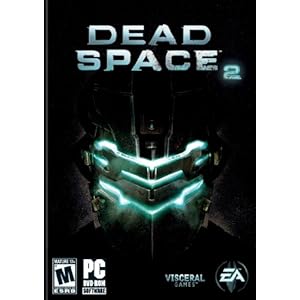
Dead Space 2 is a fine example of a video game sequel that improves on what the original game offered without actually doing anything too revolutionary. It is again a polished, enjoyable, refined experience, one that takes few real risks but is solidly enough built that it is fun regardless of its lack of ambition. The biggest thing the game tries that the original didn't is turning protagonist Isaac Clarke into an actual character, giving him a voice and more obvious motives, and having his actual face appear much more often. It's a change that works, and helps give the game a bit more weight, as Isaac feels more like a person than a cipher through which to shoot a bunch of monsters.
Making Isaac into a person improves the game's ability to tell a story in general. The first game had an excellent presentation, with nice graphics and a lot of effective sound design that sold the brutally gory sci-fi horror concept despite a lot of the bare essentials not being very original. The way every bit of the interface is built into the game world itself sells the setting as a believable place, and helps you look past the obvious inspirations from previous games on movies. It was hard to care about the story though, and Dead Space 2 improves on that by characterizing Isaac and giving him more people to talk to and larger stakes for him to actually care about. It's still not a particularly intriguing or unique story, but I was at least more invested
The gameplay is pretty much exactly along the same lines as it was in the first game. You stalk your way through various corridors and rooms in a space station that has been overrun by freakishly mutated people, compelled to kill you by alien technology you don't quite understand, by any means necessary. You find a plasma cutter early on, a tool which doubles as a weapon, and use it to slice off the monsters' limbs in order to kill them. You will buy improved armor and new weapons at store kiosks, a lot of which you'll recognize from the first game, but some of which is new. It's a constant balancing act, as sometimes you'll find yourself with an inventory full of ammo and health kits, and at otherwise you'll be desperately scraping for any items you can find and hoping the next room has a save point instead of another swarm of enemies. Once in a while you'll come across a basic puzzle to solve in order to advance, usually in the form of some kind of machine you need to get working. It's all very familiar, but a bit more refined and balanced to keep you challenged but not too frustrated.
Where the game is definitely improved is in the segments where the gameplay dramatically changes and forces you to do something else. This might take the form of a zero gravity segment, which features improved controls and maneuverability over similar areas in the first Dead Space, or something else entirely. The more dramatic moments rely less on familiar video game tropes such as boss fights or the original's dreaded turret sequences, and more on creating exciting scenarios straight out of an action movie and having you struggle through them on your wits and reflexes. It's both fresher than a more typical divergence and simply more fun to experience, and definitely something I'm glad they worked on, as it was the biggest issue with the first game.
The Dead Space franchise is never going to win awards for originality, and the extent to which they expect you to play all kinds of other games and watch movies and so on to actually get the entire story, when the story itself is far from the real draw, is a bit off-putting. But you can't deny that the games are well made, and deliver on their promise of bloody shooting action in a fun and occasionally creepy setting. Some of its attempts at horror are cheesy or just downright exploitative, but you can't say they aren't trying, or making a boring product. A third full game is supposed to be on the way, and I wouldn't be surprised to find myself playing it in a couple of years.
Wednesday, February 15, 2012
50/50
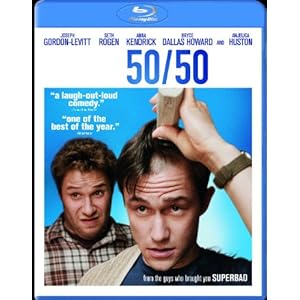
50/50 is less a comedy about cancer, and more just a serious film about cancer that happens to be quite funny at times. Knowing that it was based on the writer's own experience, it's not hard to figure out how the movie will end, but on its way there there's plenty of raw emotion and dramatic weight to scenes that require it, so it's definitely not the easiest movie co-starring Seth Rogen to watch that you'll ever see. I thought the script did an excellent job of balancing the crap that the main character has to go through and not sugar-coating the tough reality of being sick with the required levity of a wisecracking best friend and some romantic elements. It allows the movie to be respectful of the pain and loss cancer can cause without getting too self-serious or overindulgent in examining the suffering of human existence. Not every moment is perfect, but the movie is sincere and pretty consistent rewarding.
The cast is also pretty solid, with a mix of younger stars and talented industry veterans. Joseph Gordon-Levitt had to step in at the last minute, but I thought he was good as usual. His character isn't as charming as he usually is, since a lot of the time he's weak and sick and in an understandable bad mood. But he stays likable anyway, and somehow makes being a cancer patient seem relatable. Rogen is actually friends with the writer in real life, so in a way he's acting out something that's already happened to him, and while he doesn't exactly have to do a lot of serious acting, his character is an important one for keeping the story balanced and he's fine as his usual Seth Rogen self. Anna Kendrick's role definitely reminded me of her part in Up in the Air playing a woman who seems a bit young to be in the position she is professionally, and again makes that sort of character sympathetic with a mix of quirks and flaws. There are other characters who come and go throughout the movie to varying effect, but I thought the scenes featuring Gordon-Levitt and one of the other two were usually the best in the movie. I guess it was a bit too much of a raunchy (dialogue-wise, anyway) comedy to get serious award attention, but it's definitely one of the better movies from last year that I've seen.
Monday, February 13, 2012
Movie Update 39
You know the drill.
Charade

A comedy/thriller/romance thing starring an aging Cary Grant and a still young looking Audrey Hepburn, who try to track down some money her husband stole before his death before they get killed themselves. It's sort of like an Alfred Hitchcock movie that doesn't take itself quite as seriously, with plenty of twists and turns in its mystery and plenty of murders getting dramatically discovered. The script is really fun and never stops adding new elements, though by the end I was really wondering if so much deception by certain characters was really necessary or advisible. An entertaining movie nonetheless.
The Game

One of David Fincher's earlier films, and another one with a script that packs plenty of memorable moments and surprises but doesn't quite end up telling a believable story. Michael Douglas is a wealthy businessman who perhaps takes his job too seriously, and whose life is turned upside down when his brother (played by Sean Penn in a small but interesting part) gives him the birthday gift of a "game" from a company that promises to make his life exciting and unpredictable in the spirit of fun. Things start to go horribly wrong, and you're left to wonder whether it's all part of the game or if the company is actually out to get him and the money he controls. I couldn't really take the premise seriously because it was just too elaborate for anyone to really pull off, but I still enjoyed the movie for Douglas' increasingly perplexed and unhinged performance and Fincher's direction, which was already distinctly in his own style.
The Motorcycle Diaries

A movie about a bike trip that Che Guevara took around South America with his friend and wrote about himself, one that turned him from a normal upper class Argentinian into a political revolutionary who would eventually become one of the world's most notorious radical communists. The movie doesn't go too far into what he would eventually become, but inequality is definitely a bit part of the story, and Guevara is portrayed very sympathetically, almost saintlike in his devotion to honesty and helping people when he can. Ignoring any thoughts you might have about the movie politically, I thought it was a well shot and beautiful movie, if sometimes a boring or tedious one. Not great, but it was certainly interesting to see the perspective.
OSS 117: Cario, Nest of Spies

Before director Michel Hazanavicius and stars Jean Dujardin and Bérénice Bejo made this year's Best Picture frontrunner (I'm guessing) The Artist, they collaborated on this, another tribute to older cinema, though in this case it's 50s and 60s spy movies rather than silent film, and more overtly parodic. Dujardin stars as 117 a suave and talented French secret agent who is sent to clean up a mess in Cairo after his old buddy and partner gets killed while undercover. He meets a local played by Bejo who acts as his liaison in Egypt, and then proceeds to uncover or stumble into a complex web of betrayals and conspiracies that make up the secret underground of the city. 117 is at times both the perfect agent and a joke of one, sometimes effortly dispatching an assailant or slipping into bed with an exotic beauty, sometimes being obnoxiously sexist or intolerant of Islam or missing an obvious clue. The movie slips up with a sour moment now and then, but it's most a very entertaining spoof, and Dujardin is a great leading man, meaningless comparisons to George Clooney aside. They made a sequel, and I'd like to see it soon.
Tuesday, February 7, 2012
Game Update 21: 3DS GBA Ambassador Games
I've still only touched a handful of the ten free Game Boy Advance games I got along with other early Nintendo 3DS owners late last year. I've played quite a bit of them though, and this is what I think.
F-Zero: Maximum Velocity
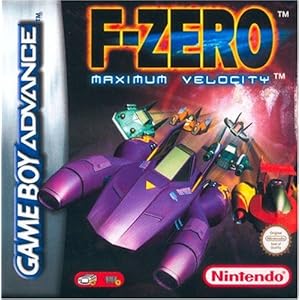
There's a type of gamer that has emerged fairly recently, one who probably has the skill to complete games on harder difficulties, but is more interested in seeing all the content a game has to see than being challenged, and so plays on easy mode in order to do so without frustration. They are content tourists, and I have been known to become one when I'm playing a type of game I'm not really into. Racing games where you have to finish a certain place or better to advance to the next course are not kind to this type of gamer. F-Zero is even worse, because there's no chance of coming from far behind - you have to finish at a certain place in each lap, and that place gets higher with each circuit. And with the fact that every course looks pretty much the same, I'm not much interested in acquiring the skill to do better in order to see all that content. A functional game but not a very fun one.
Mario Kart: Super Circuit
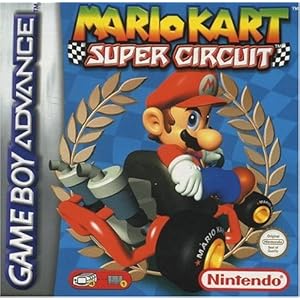
Super Circuit is a bit better than F-Zero, because at least the easiest mode actually seems like it's pretty easy. It's still not terribly entertaining, though - racing games done with non-3D tracks are just a dicey proposition, and this version of Mario Kart is playable but just not very enticing. I've played a bit of Mario Kart 7, and it's night and day how much more fun that game is, even with the increase in annoying item usage. Another game I don't intend to revisit.
Mario vs. Donkey Kong
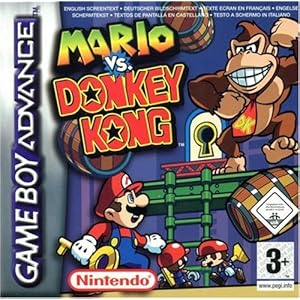
This is a fun though occasionally frustrating puzzle platformer, which at times places great emphasis on both of those skills. Donkey Kong captures a bunch of Mario's little robot versions of himself, and he has to get them back. Each world has a similar progression - six standard levels, which require you to find a key on one screen and then a robot on the next, a seventh level where you have to guide the robots you've collected to a toy box, and a boss level where you face off with Donkey Kong before he runs away and you go to a new world with a different theme. As I said it's a pretty entertaining game, though there are some weird quirks, like how there's a tutorial video before each level that only hints at what you'll have to do next, and even with all of that help plenty of game elements are introduced without explanation. A whole second mode was unlocked after I saw the credits the first time, but I don't find myself interested in it - I think I got my fill of the gameplay already.
WarioWare, Inc.: Mega Microgame$!
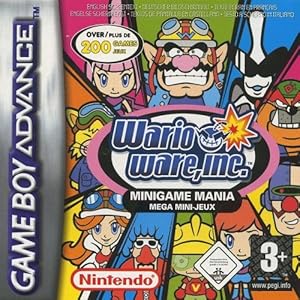
I definitely had more fun with this than anything else on this list, despite the WarioWare thing not really being a fresh concept anymore. The game is basically the industry itself in a nutshell - you visit various developers around the city, and try out their various games in some sort of strange situation that can handily represent your metaprogress in the actual game itself. The games can mostly be finished in three seconds or left, and your goal is to just finish as many as you can before you make too many mistakes, as they are randomly chosen and fly by at great speed. It's a funny and addictive experience that's also packed with a lot of extras such as endless versions of some of the microgames or special two player ones which can be played on a single system. There's a manic, crazed energy to the whole thing, and it's just a good time.
Monday, February 6, 2012
Movie Update 38
Hey, how about I write a little bit about some movies I saw recently and then you can decide whether or not you agree with me.
Lethal Weapon 2

I have to admit I kind of miss movies like this - big summer blockbusters that don't rely on high concept science fiction to get their thrills. It's not that I don't like science fiction, obviously, I just miss action movies that aren't about superheroes or robots or vampires or whatever. Lethal Weapon 2 isn't even that spectacular - it's just a solid buddy cop movie with a enjoyable rapport among the main characters and some fun, bloody action scenes. But that's all it really had to be. I'm glad I watched it.
Peggy Sue Got Married
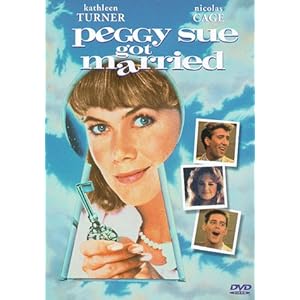
I don't know how many times I can keep saying that Francis Coppola had a strange career after the 70s, but it's still true. Back to the Future got the lasting attention, but Peggy Sue Got Married is another time traveling 80s high school comedy thing, starring Kathleen Turner as a woman who loses consciousness at her 25th high school reunion and wakes up as a 17 year old again, determined to make different choices and not even sure that any of it is actually real. The movie plays up the drama a fair bit and is less wacky than most movies of its sort, but its highlight is definitely Nicolas Cage, from his hair to his bizarre voice to his whole demeanor. Odd, but more fun than most of Coppola's other odd movies.
Shane

I believe this is the final film from AFI's revised version of the 100 best American movies that I've seen, and it's a pretty good one. Alan Ladd stars as the titular character, a gunman who tries settling down with some farmers out West, but finds he is unable to escape his past when they get increasingly harrassed by men who want control of the whole territory. There's an annoying kid who comes close to ruining the movie on a number of occasions, but it manages to survive as a classic example of a solid but not great 50s Western.
Speed

Another fine example of a blockbuster action movie that didn't need an impossible concept to work, although it does rely pretty heavily on a gimmick. I know I'm one of the last people to see this movie, and I don't need to tell you what it's about, but I will say the movie does a pretty good job of adhering to a traditional and workable story structure despite a great deal of it taking place on a speeding bus. There's very little in the way of real human on human violence, but due to the clever exploitation of the plot's strange circumstances and the chemistry of the main cast it remains exciting for most of its duration. I liked it more than I expected to in any case, and Keanu Reeves' bad acting is in fine form.
Sunday, February 5, 2012
Game Update 20: DLC Round-Up 5
It's getting close to a year since I've done of these. I'm not quite as focused on seeing every piece of content from every game I play as I used to be.
Bioshock 2: Minerva's Den

Minerva's Den has a reputation as one of the best DLC add-ons for a game ever made, and it's well earned. If you didn't need to buy Bioshock 2 first to play it, I'd say you could just skip it and play Minerva's Den to get all you need out of the experience. It serves as a sort of smaller version of the main game, again having you play as a Big Daddy and collecting most of the same equipment as you experience a story that's a lot more tightly written and emotionally effective than the main game's. It always seems a bit odd to focus on praising the narrative of a video game, especially a downloadable add-on, but Minerva's Den really is exceptionally well conceived and executed. Worth checking out even if you didn't love the main game.
Deus Ex: Human Revolution: The Missing Link

Another add-on that acts as a microcosm for the main game, The Missing Link explores a gap in Human Revolution's story and basically allows you to make a new Adam Jensen from scratch that you will use for a few hours before the story wraps up and connects back to the main plot. You begin on a ship and eventually end up on another secret base, which you can either sneak or shoot your way through until you reach the ending. Obviously this DLC doesn't capture the other side of the game that lets you just walk around and explore, and there were a few annoying aspects of the level design, particularly the way the mission requires you to go back and forth in the same space repeatedly and pass through the same extremely slow doorways until you get sick of them. But if you really enjoyed Human Revolution like I did, it's hard to say no to another clandestine base to infiltrate, especially if you can get it on sale.
L.A. Noire: Rockstar Pass

None of the DLC for L.A. Noire was very substantial, but the way Rockstar distributed it was very cool. There were several individual cases that were available for download for okay prices, but if you knew you wanted to play all of it, you could plop down a little extra for the "Rockstar Pass" and get all of it as it came out at a lower rate. It encouraged people to pay more up front with the knowledge that they wouldn't miss anything. The cases themselves seem like they were merely snipped out of the main game without much thought, some of them even revealing certain story elements that were referred to "later" in the main plot without explanation. The original game was plenty long enough, so I didn't feel cheated, and the cases themselves were a natural extension of what made the game fun in the first place. Neat investigations and adequate action sequences abound.
Portal 2: Peer Review

The best kind of DLC is free DLC, and Valve knew that when they put out Peer Review, an extension to Portal 2 that added something similar to the challenge mode from the first game that was missing in the sequel, and more importantly, added a new section to the already stellar co-op campaign. This section mixed and matched various concepts from earlier in the co-op to put together some really fiendish puzzles, creating perhaps the most difficult (and no less entertaining) Portal gameplay that I've experienced. And of course it's framed within the context of Portal's very funny and entertaining universe, which means plenty of new GLaDOS quips and robot antics to laugh at. It's hard to get a better value for your no dollars.
Tuesday, January 31, 2012
Deadeye Dick

At this point, the formula for a Kurt Vonnegut novel is so clear and familiar that it's almost completely transparent, but they're still so enjoyable to read that it's hardly worth caring. Like a lot of his work, Deadeye Dick is less a novel with a plain, straightforward narrative and more of a jumbled memoir of a character who seems like some possible version or aspect of Vonnegut himself, examining the absurdities of life and America and society through events that range almost everywhere on the scale between hilarious and depressing. He had his method down to a science by the 80s, and the result is yet another easy to read book that I liked a lot and wouldn't mind going through again.
This particular book is about Rudolph Waltz, a man born in the 1930s to very silly parents and whose entire future is affected when he accidentally does something horrible when he's twelve years old. We learn a lot about his life and the lives of his close family members, and also little snippets about the various other residents and famous events in Midland City. As far as recurring Vonnegut elements go, the novel returns to science fiction with the concept of a neutron bomb that can wipe out the residents of a town without actually affecting the non-living landscape, and it shares a location and some characters with Breakfast of Champions. I'm not sure that the two stories can actually be reconciled into a single continuity, but that was never the point of Vonnegut's writing anyway. Deadeye Dick isn't his most innovative or surprising work, but it's still a very entertaining and occasionally poignant novel, which is pretty much the writer's real trademark.
Monday, January 30, 2012
Fawlty Towers

Fawlty Towers is a sitcom co-written by and starring John Cleese as Basil Fawlty, the eccentric and put-upon owner of a small hotel in England. Coming not long after Monty Python's Flying Circus wrapped up, it's kind of surprising how standard a show it is, but it manages to be very funny regardless, and with him playing so many small parts while working as a member of Monty Python, it's hard not to say Fawlty is the best character Cleese ever played. The show takes place almost entirely inside the hotel, and the plots revolve around the mishaps and misunderstandings that seem to occur on a daily basis, as Fawlty butts heads with his wife, his dimwitted Spanish waiter, and the various guests who rent rooms. Other recurring characters include a couple older longterm renters with a few running jokes and Polly, a part-time assissant played by Cleese's writing partner and then-wife Connie Booth, but who doesn't do much besides occasionally help Fawlty with his elaborate attempts to conceal problems from his guests and his wife.
The show is a little hit and miss, because while it's almost always funny, some of the episodes revolved around plot ideas that are fundamentally frustrating for a viewer. I realize that it's sitcom convention for small lies to balloon into big ones very quickly, but when the small lie that starts things off seems unnecessary in the first place, it can lead to a whole storyline being irritating to watch even while the individual gags can still be quite funny. The best parts of the show are when Fawlty is matched up against a guest who happens to be a huge pain in the ass to begin with, and the comedy comes from both his befuddlement and abrasive rudeness in response. Things usually escalate in a remarkably madcap fashion, often ending in complete chaos at the end of the episode. The best one was probably the finale of the first season, which begins with Basil running the place by himself while his wife is in the hospital and ends with him trying to do the same while heavily concussed and failing to avoid upsetting a group of German guests. I don't think anyone will ever call Fawlty Towers much of an innovative show, but that doesn't prevent it from still being wonderfully entertaining and laugh-out-loud funny over 30 years later.
Sunday, January 29, 2012
Movie Update 37
You know what's up.
Crimewave

This is the only produced Coen brothers script that the brothers didn't direct themselves, though the duties were taken by their friend Sam Raimi. It combines elements of both of their careers in film, and combines them to create what might be best described as a live action Looney Tunes movie. The subject matter is darker, but the actual content of the film really isn't. When a man hires a couple of goons with silly voices to kill his business partner after finding out about his betrayal, they end up going on a rampage through the city, with one of the man's employees and a girl he meets getting caught up in it. It's a very strange and silly movie, with some very elaborate comedic setups, surprisingly exciting moments of action, and an entertaining appearance by Bruce Campbell. A bizarre film that you'll probably like if you're a fan of the filmmakers involved.
Dracula
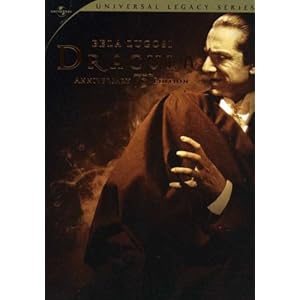
It's always interesting to me how sterile and stately the horror films of the 20s and 30s are. Genre icon Bela Lugosi stars in his signature role, instilling Dracula with charm and menace as he moves from Transylvania to London in order suck a lot of blood. It's of course pretty toothless in comparison to modern vampire stories, but I mostly enjoyed the slow discovery by the other characters of what Dracula really is and their calm attempts to prevent him from killing or enslaving any more women. Heh, toothless.
One from the Heart

Post-70s Francis Ford Coppola continues to make absolutely no sense to me. One from the Heart tells the story of a couple in Las Vegas that finds their relationship falling apart, and their struggles to either resolve their differences and move on with their lives. What makes the movie different is its musical quality - the characters don't really sing, but the original music by Tom Waits pervades the whole thing, it frequently dabbles in an unreal sense of space, and the film is entirely and totally obviously filmed on elaborate sets at a soundstage. The movie's budget problems and failure at the box office cost Coppola a ton of money, and a lot of his career from then on can be attributed to continued financial problems. Was it worth it? Uh, not really. The movie is okay.
Witness for the Prosecution

A courtroom drama directed by Billy Wilder, based on a play, based on a story by Agatha Christie. Other actors get higher billing, but the star of the show is definitely Charles Laughton, an aging English lawyer who was recently released from the hospital and decides to take on the defense of a man accused of murder, against his doctors' wishes. The trial itself is pretty straightforward, until the characters start making unexpected choices and Laughton has to stay on his feet to deal with the changes and continue the defense to his best ability. The ending is so twisty that a voice actually advises the audience to avoid spoiling it to their friends so they can enjoy it too. It's a well-made and wonderfully acted legal drama that wraps up satisfyingly without letting anything come too easily.
Saturday, January 28, 2012
Chuck - Season 5

For its entire existence, Chuck has been an uneven show. There are some things it has always done well, mostly involving making its central characters sympathetic and likable, though they've been known to make annoying decisions at various points. There are some things it has had trouble doing consistently, but can often manage. It is occasionally very funny, though it also often isn't, especially when they return to the Buy More for yet another boring B story. And there are some things it has never quite gotten right, mostly involving the spy stuff. It will have moments of inspiration or clever homage, but it's often buried in too many references or plotting that is just poorly thought out and irritating. None of these aspects of the show really changed in the show's brief fifth and final season, but I would say it's probably the show's best since the second, because the action/drama side was at least occasionally competent, and the focus was on giving those likable characters fitting conclusions, and they all got fitting and occasionally touching send-offs, even Jeff and Lester, the bozos who are usually tolerable at best.
The silly idea of the Intersect has always been central to the spy aspect of the series, and that's once again the case this time, though they thankfully managed to put a twist on it by no longer having it stuck in Chuck's head the whole time. It's still the center of the plot though, as a bunch of guest actors and returning villains are brought on and dealt with in rapid fashion as the show teases some possible story arcs but doesn't really stick with any of them for a long time. The last handful of episodes do finally build a sense of momentum with a bad guy who lasts more than an hour, and a gut punch of a plot twist that is surprisingly effective considering how terrible the scene in which it occurs is. It leads to an ending that is not quite the comfortable fairytale finale I was honestly expecting, but is still a touching and hopeful one that does justice to characters who have maintained my affection despite the show's many ups and downs over the years. Chuck was never as good as I wanted it to be, never managing a way to mix espionage and humor in a way that does justice to both, and never quite doing enough with a protagonist that manages to be relatable to nerds rather than an irritating stereotype of one. But while it had flaws, it never stopped being easy to root for, and I'm glad the creators got the opportunity to end the story in an acceptable way despite the series never really growing beyond its small but dedicated audience.
Monday, January 23, 2012
The Legend of Zelda: Skyward Sword

The first regular Zelda game on a console in five years came out as the Wii's life cycle began to wind down to a close, perhaps too late for it to have a major impact on the gaming landscape. I think Skyward Sword is a really good game, and I certainly had more fun with it than I did with Twilight Princess. But Twilight Princess came out in 2006, and Skyward Sword doesn't do enough differently to be as notable as that game was at the time. People were hoping for Nintendo to really do something different with the series, and while they made a polished and enjoyable adventure, it's not much different from what we're used to.
I do generally like the setting and general story of Skyward Sword - it goes back to the beginning of the series, and shows the origin of a number of elements that have recurred often throughout the twenty five years that they've been making these games. The game's a bit slow to get going, features repetitive dialogue, and has some interludes that don't really lead anywhere, but the game was designed well enough that it didn't really feel like a slog before it got going. There's a bit more to the characterization than there was in the past, too. It's hard to really develop the cast too much when they don't really speak and almost all of their dialogue is exposition, but the main players felt more like people than they usually do. And while I'm tired of gorons at this point, they did make a point to introduce several new types of creatures.
The game follows a familiar structure, starting you in an introductory area to learn the ropes, slowing allowing you to enter new areas, and accomplishing various tasks in between trips into dangerous, puzzle-filled dungeons that are the meat of the gameplay, before eventually pushing you toward an endgame that leads to the final boss fight. The sections between dungeons were more involved with usual, and while they aren't quite as tricky, they do feel like real, focused challenges rather than filler you have to do before you're allowed to advance. You will acquire items you need to get past certain obstacles, learn to fight new enemies, and encounter interesting things in the world before you can advance. I also thought they did a good job with side quests this time, or at least it seems that way since I did more of it than I have since Majora's Mask came out. A lot of it revolves around Skyloft, the town in the clouds you start the game in, which isn't particularly big but is filled with people who have a problem they need help with or some useful equipment to sell you.
It's interesting to look at how the dungeon design has changed over time with these games. The older 3D games had lots of simple, repeatable challenges like having to light torches or push blocks, and tons of locked doors with tons of keys to unlock them. Over time the design has gotten more focused, with fewer keys and more specific, location based puzzles as the technology and sophistication of the design has improved. I wouldn't say they're necessarily more fun, but they're thought through a little better. The boss fights are about what they always are - some are tougher than others, none are truly frustrating, and they all test what you've learned and the items you've found in unexpected and satisfying ways. The biggest problem I had with most of them though tended to revolve around the controls - the Wii version of Twilight Princess had you swing the remote to make Link swing his sword, but Skyward Sword is much more specific about it, with every item depending on your ability to aim or swing precisely with the remote. It's a function system, and the way it influences the combat is interesting, but there were often still issues getting it to work precisely and it led to a few frustrating moments.
One problem the series has always had that Skyward Sword fixes is that there's actually a use for all the money you find. You don't have to worry so much about the size of your wallet, and you can buy things like potions (which are actually useful since fairies don't fill your health bar up any more), larger pouches for your ammo, and special gear with various uses, and you can also collect bugs or rare treasures to pay for upgrades to your gear. I still say Zelda is an action adventure, but these changes make the game feel a bit more substantial and closer to an RPG. Something they haven't fixed is the feeling of the game being padded out a bit, which is especially noticable towards the end. Yes, there's another lengthy segment that feels suspiciously like a fetch quest, and while there's enough unique stuff to do that it isn't entirely lazy, it does feel unnecessary since the game is plenty long without it - I left a fair amount of optional content on the table, and the game still took me 40 hours to beat.
Skyward Sword definitely has a few warts, and it's hard to shake the feeling that the Zelda series is behind the times, even ignoring the fact that the Wii can only display it at 480p in the year 2012. But it's still a Zelda game, and that means it's a charming adventure with some enjoyable dungeon and combat design, and an experience that's entirely comfortable to sit through. Perhaps that slight lack of ambition keeps it from being an absolutely classic game, but it's still one I'm totally glad I took the time and effort to play.
Monday, January 16, 2012
Movie Update 36
These were expiring, so I watched them. Yep.
Ball of Fire

A screwball comedy directed by Howard Hawks, featuring Gary Cooper playing off type as an awkward, stuffy intellectual and Barbara Stanwyck playing very much on type as a club singer and mob boss' girlfriend who helps him and his fellow encyclopedia writers come out of their shells. Ball of Fire is mostly an enjoyable movie, though there's definitely something very weird about it. The professors are all pretty likable guys, but it's just a little uncomfortable seeing them all fawn over a young and attractive woman, even if it's innocent. The shift from her using them to avoid the police to actually getting romantically interested in Cooper is pretty abrupt as well. As I said though, it's mostly a fun movie.
Deathtrap

Sidney Lumet movies are often based on plays or feel like they could be, taking place in a small number of locations and not being particularly visually flashy. That's definitely the case with Deathtrap, though I think the entire thing being limited mostly to a single house works in its favor. Deathtrap was a play about writing a play based on a murder, and the fact that the movie version isn't a play itself does do a little to remove some of the inherent cleverness of the structure. But the story still works, and the performances by Michael Caine and Christopher Reeve are really good. I can't say as much about the other characters, but it's both an amusing and incredibly tense movie at times, with some great twists and surprises.
The Life and Death of Colonel Blimp

It was a big surprise for this movie to be in color, though apparently that was a thing for its makers Powell and Pressburger while most directors from the 40s were still working in black and white. The movie is based on British cartoons about a blowhard English military man, though it tells an original story about how such a man might come to be like that over a lifetime of fighting in wars. Roger Livesey and Anton Walbrook give a pair of great performances, first as young soldiers, then as middle aged veterans of the first World War, then as old relics at the beginning of the second. There's also an amusing bit with Deborah Kerr playing three different women who all look the same at various points in his life. The movie is concerned with many things, but the main one I thook away from it is how a lifetime of experiences can affect a person and make them who they are. A great and refreshingly civil war movie.
Odd Man Out

Carol Reed's The Third Man is a classic of the noir genre, though I can't say I enjoyed Odd Man Out nearly as much. It has an interesting subject, with James Mason playing an IRA leader who gets wounded and stranded in the middle of Belfast (though the film is not actually explicit about either of those references). There are some interesting moments sprinkled throughout, though I was mostly kind of bored while I was watching it, which shouldn't happen with a movie about hiding from the police and troublesome politics. I didn't think it was bad, I was just rarely actively intrigued by what was happening, and with a genre that thrives on intrigue, it was disappointing.
Sunday, January 15, 2012
The American President
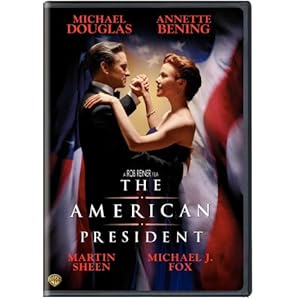
It was pretty amazing how much this felt like an alternate universe's version of The West Wing. Aaron Sorkin wrote it, in much the same style as the show, with lots of intelligent back-and-forth dialogue and well-timed dramatic speeches. It has a movie budget with a movie cast and a movie director in Rob Reiner, but it's filmed pretty plainly and on the same sets as the show. Most of the characters have pretty clear equivalents from the show. Michael Douglas' President Andrew Shepherd is not that different from Josiah Bartlet, and Martin Sheen even plays a chief of staff similar Leo from the show. It shares a couple other cast members like Joshua Malina, and the rest of the actors are a mostly recognizable bunch, playing roles they might have played on television had they not been more successful. Michael J. Fox is another member of the staff, and Richard Dreyfuss plays a Republican senator with designs on the presidency.
The focus is a bit different than The West Wing though - while it does get into some of the nuts and bolts of politics, particularly the wrangling it takes for controversial bills to get through, it's mostly in the service of a romantic plot that's the real core of the story. The President is a widower due to his wife's death before his election, and he hasn't been really looking to date while in office. Annette Bening plays a lobbyist who gets a job in Washington, but things quickly get weird when she and the President hit it off and they start seeing each other regularly. There's a lot about whether a President, even a very popular one, could ever have a non-marital relationship in office in this day and age.
Dreyfuss' character is cartoonishly evil and slimy, and uses the situation to smear the President, who doesn't stoop to defending his personal life despite falling approval ratings. His personal and professional lives though finally collide near the end, once the health of his political goals come into conflict. It's a bit more silly and outlandish than anything you'd normally see in a regular story of politics, but it's not a politics movie - it's a romantic comedy with a political setting. It does the job well enough, but I'm glad Sorkin didn't get it out of his system and went on to use a lot of his ideas to create one of the best TV dramas of the last decade.
Saturday, January 14, 2012
Rise of the Planet of the Apes
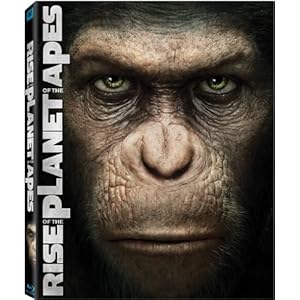
The only movies in this series that I've seen previously are the original and Tim Burton's terrible remake. I like the first movie, but I didn't have much hope for another attempt to revive the concept, even if a story about how apes taking over the planet might actually happen is more interesting than just doing the first movie again. I was surprised by how much I enjoyed it, though. Rise of the Planet of the Apes is certainly flawed - the science is mostly pretty silly, and a lot of the human characters are generic summer movie tropes with nothing to them. But the movie does a few key things right, and the result is a perfectly solid popcorn movie, and the rare kind of one that actually has a soul.
The key to the whole movie is the realization of the character of Caesar, as performed by motion capture veteran Andy Serkis and animated by Weta. If they didn't have him as a central figure around which to base the story, they wouldn't have that much. But by establishing the character and using him so well, they turned what could have been a simple monster movie into something more complex and interesting. What's so different about the movie is that it's not clear what exactly we're rooting for. Normally that would be a problem, but here that conflict is an essential part of what makes the whole idea interesting. In the end, it's clear that the apes are not the bad guys - man's own hubris is. And while that's not exactly a new idea in the realm of science fiction, for once I didn't feel like an anti-science message was being rammed down my throat. It wasn't that we are wrong to try to advance medicine by playing god, it's that sometimes there are unforeseen consequences in the relentless pursuit of power and profit. And I was fine with that.
The reason the apes aren't outright good guys, besides the fact that their victory means the eventual extinction of humanity (as humans we are naturally inclined to be against the death of all humans), is James Franco's character, a scientist who's pushing hard on a drug that allows brain cells to repair themselves and could potentially cure victims of degenerative diseases like Alzheimer's, which his father has. I don't understand why John Lithgow was cast as the father when it's not a significantly meaty role and his mere appearance makes most people get ready to start laughing, but he helps humanize Franco, along with his girlfriend played by Freida Pinto, who pretty much only exists in the movie because they wanted a female character.
When one of the apes the drug is being tested on gives birth and Franco is forced to care for the baby, he both realizes that the drug has intelligence-improving as well as restorative potential and develops a strong bond with the ape. Their connection is what drives most of the drama and more heart-wrenching moments in the story, and Franco and Serkis make a good pair, even if only one of them is ever actually on screen. As Franco's reluctance to continue pursuing the drug grows in the face of the dollar signs growing in his boss' eyes, a more outright conflict develops as more apes get their cognitive abilities boosted and Caesar becomes a Spartacus-esque figure (sort of ironic given his name, I guess). It builds to a climax that is more complex than summer movies usually go for, and the ending does plenty to seed a sequel that could take place either soon after or much later, closer to the time of the "beginning" of the story. I'm not sure which I'd rather watch, but I will say I enjoyed this movie the most of three that I've actually seen. As dopey as some of the characters in Rise are, and as much as I didn't like it going back to the well on some of the original's famous lines, it's still overall a less silly and more competent film.
Thursday, January 12, 2012
Best Shows of 2011
Once more, with feeling: this list was chosen from seasons of shows that had their season finale air in 2011. So for the network shows, material that occurred way back in the fall of 2010 is relevant, and the brand new seasons aren't. It's just the only way to make it work, okay? I don't see the value in looking at it otherwise. Stop looking at me like that.
Best of 2011
10. It's Always Sunny in Philadelphia (FX)
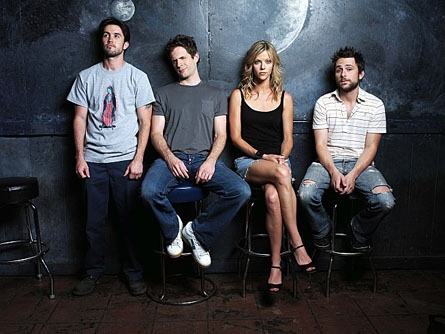
It's Always Sunny doesn't have the human core that it would take to be my favorite comedy on television right now, but that's by design. It's about a bunch of loudmouth jerks who do terrible things to each other, and that's been the launching point for a lot of great comedy in the last seven years. Just going by the strength of the laughs, this was one of the better seasons in the show's run, which is quite a feat considering how generally consistent it is with its cast and its writing. It's not that new anymore, but what they're doing is still so good that I don't really care.
Favorite Episode: "Frank's Pretty Woman"
9. Sons of Anarchy (FX)

This could have possibly ended up higher on the list if the finale turned out differently, but it was still an exciting, tension-filled season of a show that does a great job of balancing baser thrillers like gun fights and car chases with some really strong human drama that drives everything. It turned out to be sort of a table setting season in the end, but the journey to reach its lukewarm conclusion was at times as brilliant as anything else I saw on TV last year.
Favorite Episode: "Hands"
8. Parks and Recreation (NBC)

The third season of Parks and Rec built wonderfully on the second, continuing to develop its ensemble cast into one of the most lovable bunches on television while adding two more talented people to its cast in Adam Scott and Rob Lowe. They also did a lot to gradually turn Pawnee, Indiana into one of the most fully developed and enjoyable fictional towns in TV history. It's just a show that's always growing, and never feels like it has to stop. It doesn't blow my mind as much as shows higher on this list, but it's wonderful all the same.
Favorite Episode: "Media Blitz"
7. Louie (FX)

I don't know if I'd like Louie more if the show made more of a concerted effort to be funny. Because as much as I love the fact that Louis C.K. can do pretty much anything he wants with the show, and am frequently moved or affected by some of his wilder experiments, I still often find myself thinking that the inserted moments of his regular stand-up comedy are the most enjoyable bits of the show. Still, it's hard to fault the show for what it is; an incredibly honest and inventive series that's more concerned with doing something different and interesting than making you laugh a few times. That's admirable, and the show is good enough to pull it off.
Favorite Episode: "Oh Louie/Tickets"
6. Game of Thrones (HBO)

You know I think was a strong year for drama on cable when a nearly perfect adaptation of one of my favorite books is my fifth favorite. George R. R. Martin's fantasy series is the definition of meaty, and television would be the only reasonable way to adapt it without totally gutting the story. That some things are simplified or lost in translation is besides the point - Game of Thrones is highly successful at bringing the series to a larger audience, and is a lot of fun to watch whether you're familiar with the books or not. The production values and quality of the cast are outstanding for television, and the dark, unforgiving world the story takes place in fits right in with the gritty cable feel. Again, not perfect, but plenty good enough.
Favorite Episode: "The Pointy End"
5. Boardwalk Empire (HBO)

For a lot of these dramas, the favorite episode is somewhat randomly chosen. Pretty much episode has something good to it, and what it comes to is which one had that one killer moment that jumps out more than the rest. Boardwalk had a very successful debut last year, and it was improved this time around, expanding on the scope of its examination of the way crime and politics intertwine in early 20th century America, and giving more time for all of its characters to grow into believable people that you care about. It's a bit too stately and concerned with symbolism to match the gripping personal intensity of HBO's very best crime dramas, but it's still damn good and always fun to watch.
Favorite Episode: "Ourselves Alone"
4. Homeland (Showtime)

Looking back, this might be the only brand new show that I watched in 2011. And if that's the case, it was a darn good pick. What starts out as a nice paranoid spy thriller quickly grows into something more, as the characters doing the watching start interacting with the watched, and it turns into a messy smashing together of personal and political turmoil. The show doesn't quite have the breadth of other dramas on this list, being so focused on a single story and a small group of characters. But what they do with that limited scope is very impressive, and worth celebrating.
Favorite Episode: "Marine One"
3. Justified (FX)

For some reason, the first season of Justified was more concerned with telling a bunch of cool little modern cowboy stories than creating a real story for its great main character, and that seemed to be the case for a little while in season two as well. But it wasn't long before it became clear what the greater plan was, as smaller squabbles gave way to an incredibly compelling story of deep rooted family rivalries in a dangerous community that never forgets past slights. Margo Martindale gave a supporting performance for the ages, and just like that, the show morphed from a solid, stylish police drama into something much greater that everyone should watch.
Favorite Episode: "Brother's Keeper"
2. Community (NBC)

Community doesn't have the consistency of tone and content that other shows might have, that probably help them establish larger and more casual audiences who know what to expect when they turn the TV on. Community's eccentricity might have contributed to its low ratings, and its removal from the spring schedule and possible eventual cancellation before it was even nearly done telling stories. But if removing the less safe elements of the show so it could stay on the air a few years longer meant that it wouldn't be as potentially exciting, unique, and simply hysterical as it routinely is, I wouldn't make that trade. The second season of the show took a lot of risks, but they almost all paid off and helped create one of the best single seasons of a sitcom I have ever seen.
Favorite Episode: "Abed's Uncontrollable Christmas"
1. Breaking Bad (AMC)

Another year, another first place finish for Breaking Bad. I can't help it. There's just no show that combines a unique visual flair, stupendous acting, dark humor, and a shocking and unpredictable plot like Breaking Bad. I don't quite think it was better this year than it was last time, but I was impressed with how they managed to shift the focus away from Walt without compromising the show's unerring watchability or the long term goals that they're striving toward. And with the way the spotlight returned to him as the season ended, it reinforced my belief that he is the most interesting, and doomed, protagonist on TV today.
Favorite Episode: "Crawl Space"
Wednesday, January 11, 2012
Best Albums of 2011
I still find myself to be more concerned with trying to appreciate the whole history of modern music than making sure I stay up to date, but I did a decent job of buying new albums. Most of it is from the year's first half, though.
Best of 2011
8. Fleet Foxes - Helplessness Blues
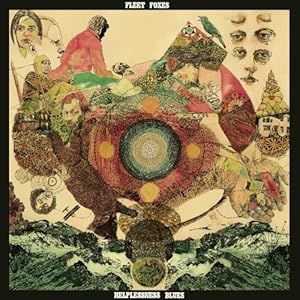
Fleet Foxes' second album isn't as original as their first, and for good reason - it's pretty much the same thing again. Still, that same thing is very enjoyable, and it's hard to fault the band for sticking with what they know and can do well. A folksy but still distinctly rock-influenced sound, and nice vocal harmonies playing off the singer's strong voice. I find it hard not to like it a lot.
Favorite Song: "Helplessness Blues"
7. James Blake

Most people probably think they have a pretty good idea of what dubstep is, but I doubt many of them think of something like this. James Blake likes to use the bass, but he does so sparingly, just like all of the other elements at his disposal. It's very sparse music, perhaps too sparse in some places, but the results are often worth it, slowly building up to and then releasing tension in profoundly effective ways. Plus the guy has a great voice, something you don't usually hear about electronic musicians.
Favorite Song: "I Never Learnt to Share"
6. Radiohead - The King of Limbs
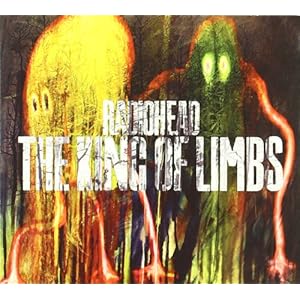
It's unusual for there to be a new Radiohead album that isn't a huge game changer, but that doesn't mean a perfectly normal album by them won't still be really good. And The King of Limbs, despite being a bit lean on running length, is definitely good. Its eight tracks experiment with sounds and styles the band has played with before, but does enough with them to make it definitely worth plenty of listens on its own. They're a band that's expected to reinvent music every time out, but as long as they stay as good as this, I'll be fine with it.
Favorite Song: "Give Up the Ghost"
5. St. Vincent - Strange Mercy

I wasn't quite sure what to expect from this considering my vague memories of having heard St. Vincent before, but I guess it turned out to be her most straightforward record. It's pretty much her guitar, her voice, and some drums, with a few bells and whistles here and there. It's accessible but also unique, a nice match of elements that are familiar with ones that feel distinct. She has a really nice voice, and most of the main vocal hooks have a tendency to get inside your head and stay there for a while. It turned out to be a really good blind buy.
Favorite Song: "Chloe in the Afternoon"
4. TV on the Radio - Nine Types of Light

Perhaps the band's least exceptional album, but the core of what they do is just so interesting me that I can't help but like it a lot every time I hear it. I'm not sure if they'll ever get back to a dirtier and more soulful sound, but simple high quality indie rock infused with the influence of African American culture is plenty fine on its own. Just a fun album all the way through.
Favorite Song: "Will Do"
3. M83 - Hurry Up, We're Dreaming

Hurry Up is a double album, but a pretty slight one. On one hand that's a bit disappointing since it doesn't feel as grand as some other albums in the same format, but on the other it's pretty remarkable that something that lasts this one is so easy to get all the way through. The music freely mixes elements of electronic and rock, and produces a number of catchy, memorable songs. Maybe a bit too much time is spent on minor experiments and mood pieces, but the overall effect is a highly enjoyable listening experience.
Favorite Song: "Midnight City"
2. The Antlers - Burst Apart
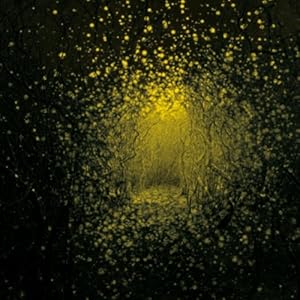
Bust Apart is not as emotionally powerful as The Antlers' last record, but it was never going to be. They decided to shift gears a bit and do something with more of an electronic sound to it, without abandoning their roots, and I like it a lot, if maybe not as much as Hospice. There's nothing too showy over the top here, it's just a bunch of songs that flow well together and are filled with beautiful noises. It doesn't demand attention, but if you do listen, it's very good.
Favorite Song: "No Widows"
1. Panda Bear - Tomboy
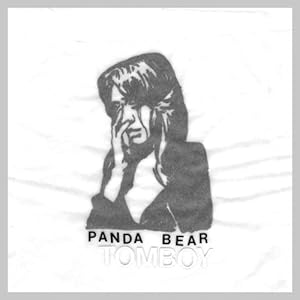
This is a case where I'd probably have a hard time really identifying and explaining why I liked this album so much, or why I'm so comfortable calling it my favorite of the year anyway. I'm also noticing just how many of these artists are heavily using synthesized elements and becoming mildly concerned. But it's all probably pretty simple. I've mellowed out and don't really look for aggression in my music much these days, and a lot of artists who grew up when popular music was no longer exclusively relying on traditional instruments are finding new ways to use different sorts of sounds and create something unique and meaningful with them. Tomboy is not really unique, but it's finely crafted and infectiously entertaining throughout.
Favorite Song: "Afterburner"

































